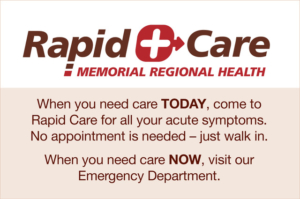It’s not always obvious where to go for care, and when. What merits the emergency department versus needing to be seen that day at Rapid Care? When can something wait until the next day, when your regular provider is available? Following is a quick and easy guide to help you figure it out in the heat of the moment.

When it’s an emergency
Let’s start at the top — determining if you need immediate care with access to greater resources — in other words, the Emergency Department at Memorial Regional Health. When you or a loved one is ill, ask the following questions: Did severe symptoms come on suddenly? Is someone losing consciousness or not cognizant? Are they experiencing chest pain or facial numbness with difficulty speaking? These are all reasons to call 911 or get to the emergency department as quickly as possible. The same goes for major injuries, trouble breathing, high fevers and coughing or vomiting blood. All infants younger than 3 months with a fever greater than 100.4 should go to the emergency room, as well.
These are all signs that something more serious is happening, which may result in needing specialty care or a hospital stay. When in doubt, don’t hesitate to go to the emergency department.
Needing care urgently
If an illness or injury has occurred, but the person seems aware and is not in extreme pain, you can likely choose the convenience of walking into Rapid Care instead of the emergency room for faster, less invasive care. A good rule of thumb is to go to Rapid Care when the condition doesn’t appear life threatening, but it also can’t wait until the next day.
“Use Rapid Care for quick care when things are acute — symptoms that come on in the past few days or week that are worrisome or suddenly seem worse,” said Maggie Schoeberl, PA-C with MRH Rapid Care.
Common reasons for going to Rapid Care include upper respiratory infections, ear infections and strep throat. If you have been sick for a while and are not getting better, or if symptoms change and become worse, go to Rapid Care. Your cold could be turning into a sinus infection, bronchitis, ear infection or pneumonia.
“Any time you have a virus, you are more susceptible to a secondary bacterial infection,” Anderson said.
Other times to choose Rapid Care — where you don’t need an appointment — is for minor injuries and cuts caused by falling or getting hurt playing a sport. Dr. Ted Akers has been practicing urgent medicine for several years, and he is especially skilled at tending to minor orthopedic problems, including sprains, strains and even fractures. He can even perform minor surgery, and he’s highly skilled at stitching up minor lacerations.
“I can care for most fractures by splinting and then scheduling patients for follow up care with an orthopedic doctor,” Akers said.
Scheduling with provider
Many people use Rapid Care simply for convenience — and there is nothing wrong with that. It is good, however, to have a regular provider. They are better able to track your health over time and catch things that are less obvious. If it’s not urgent, and you feel it can wait a day, make an appointment with your regular provider, instead.
“It’s really important to have an established provider, because everyone has their own baseline for health. When I know a patient’s baseline, I notice when something is different or if a condition is getting worse. I can also make recommendations based on family health history,” said Dr. Elise Sullivan, with MRH Medical Clinic.
To learn more about medical services at Memorial Regional Health, visit memorialregional.com. We have several providers to care for you and your family’s emergent, urgent and non-urgent health needs.





